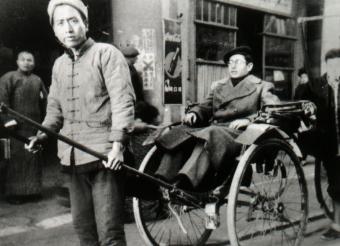 |
ZUFLUCHT
IN SHANGHAI
THE
PORT OF LAST RESORT
Joan Grossman,
Paul Rosdy
Österreich/USA 1998
Produktion:
Extrafilm, Pinball Films
Weltvertrieb: Louise Rosen Ltd. 100 Winchester Street, Brookline, MA 02446-3735,
USA
Tel. (1-617) 730 8430, Fax 730 8131
Buch,
Schnitt: Joan Grossman, Paul Rosdy Kamera: Wolfgang Lehner
Ton: Vincent Tese
Musik: John Zorn
Mitwirkende: Barbara Sukowa, Otto Tausig Sprachen: Deutsch, Englisch
Format:
16 mm, Farbe, s/w Länge: 80 Minuten, 24 B/sek.
|
Delphi-Filmpalast Mi.17.02.1999 14.00
Arsenal Do.18.02.1999 20.30
Kino 7 im Zoo-Palast Fr.19.02.1999 18.30
Akademie der Künste Fr.19.02.1999 12.00
|
| Der
Dokumentarfilm rekonstruiert die jüdische Emigration nach Shanghai
mit bisher noch nie öffentlich gezeigtem Filmmaterial aus den dreißiger
und vierziger Jahren, Zitaten aus bewegenden Briefen und Schriften von
Flüchtlingen sowie durch vier Interviews mit Zeitzeugen. Siegmar
Siemons Familie mußte fluchtartig Deutschland verlassen und lebte
in den überfüllten Flüchtlingsheimen der Hilfskomitees.
Mit vierzehn Jahren machte er sich auf die Suche nach Arbeit und konkurrierte
dabei, zu niedrigsten Löhnen, mit der chinesischen Bevölkerung.
Fred Fields flüchtete Ende 1938 als Achtzehnjähriger, konnte
bei der ‘Gelben Post’ und später beim ‘Shanghai Jewish
Chronicle’ arbeiten und lernte als junger Zeitungsmann die intellektuelle
Seite der Emigration kennen. Ernest Heppner erzählt, wie seine Mutter
einen Reisebüroangestellten mit einem impressionistischen Gemälde
bestach und bald darauf den Bescheid bekam, daß aufgrund des Selbstmordes
eines jüdischen Ehepaares zwei Kabinenplätze auf dem Dampfer
Potsdam frei wären. Illo Heppner reiste im Jahre 1940 zusammen mit
ihrer Mutter mit der Transsibirischen Eisenbahn nach Shanghai, wo sie
mit ihrem Vater zusammentrafen. Zunächst konnten sie es sich noch
leisten, im internationalen Viertel Shanghais in europäischen Verhältnissen
zu leben. Dort lernte sie Ernest Heppner kennen. |
The Port of Last Resort is
a documentary film about Jewish emigration to Shanghai (1938 to 1949).
The little-known story of the World War II Jewish emigration to Shanghai
is presented through the recollections of four former refugees and through
a collage of evocative archive materials: personal and published writings
by refugees, relief reports and secret documents, illustrated with rare
home movies, photographs, newsreels and propaganda films. Siegmar Siemon’s
family left Germany in 1939 in great haste. He and his family lived
like thousands of other Jews without means in crowded refugee homes
run by the refugee comittees. At age 14 he began looking for work, competing
for low-paid jobs with Chinese natives. The money he earned usually
paid for no more than a meagre dinner. Fred Fields was eighteen years
old when he left Berlin in 1938 by himself. He worked at the ‘Yellow
Post’ and later at the ‘Shanghai Jewish Chronicle’ and
got to know the intellectual aspects of emigration. Ernest Heppner talked
about how his mother bribed the employee of a travel agency with an
impressionist painting, soon hearing that due to the double suicide
of a Jewish couple, two cabin places had become free on the steam ship
Potsdam. So, in 1939, Heppner and his mother arrived at the site of
yet another war. Japan had occupied large parts of China. Illo Heppner
travelled to Shanghai in 1940 together with her mother on the Transsiberian
railway. They were able to live according to a European standard in
the International Settlement of Shanghai. Illo met Ernest Heppner with
whom she spent Sunday afternoons in Chinese dance halls.
|
Biofilmographien
/ Biofilmographies
Paul Rosdy lebt in Wien. Seit 1990 beschäftigt er sich
mit Film und Video: nach der Absolvierung eines Produktionslehrgangs in
Vancouver, Kanada, produzierte er mehrere kurze Dokumentationen und Lehrfilme.
Zusätzlich organisierte er Dokumentarfilmretrospektiven ('Way out
West', 'Oscar Shorts'). Er ist Mitbegründer von Pinball Films, Wien
und New York (1994).
Paul Rosdy currently lives in Vienna. Since 1990 he has
worked in film and video. After graduating from film school in Vancouver,
Canada, he produced several short documentaries and educational programs
in Austria, Canada and the United States. In addition, he organised documentary
film retrospectives ('Way out West', 'Oscar Shorts'). He is co-founder
of Pinball Films, Vienna and New York.
Films (selection) / Filme (Auswahl)
1991: You Don't Look For Street Signs When You're In A Jungle (17 min.).
1992: Release Day (14 min.). 1993: What goes around comes around (16 min.)
1994: Matzo Balls (9 min.). 1998: ZUFLUCHT IN SHANGHAI - THE PORT OF LAST
RESORT .
Biofilmographien / Biofilmographies
Joan Grossman lebt in Brooklyn, New York. Ihre Kurzfilme
haben zahlreiche Festivalpreise erhalten. Früher arbeitete sie als
Radioproduzentin und gründete einen Off-Szene-Treffpunkt für
Künstler in der Umgebung Chicagos. Sie ist Mitbegründerin von
Pinball Films, Wien und New York (1994).
Joan Grossman lives in Brooklyn, New York. Her short films
have won numerous festival awards. Formerly, she was an award-winning
radio producer and the founder of an underground arts space in the Chicago
area. She is the co-founder of Pinball Films, Vienna and New York (1994).
Films (selection) / Filme (Auswahl)
1986: Down & Out New York City. 1991: Creatures of Habit. 1991: High Stakes.
1994: Matzo Balls. 1998: ZUFLUCHT IN SHANGHAI - THE PORT OF LAST RESORT. |


|